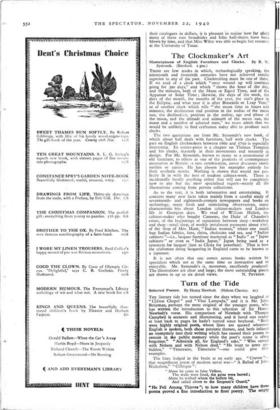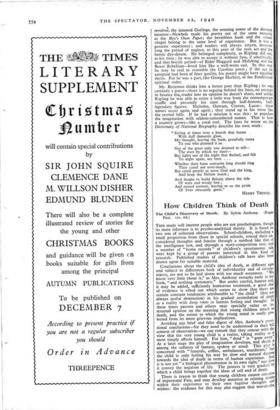Turn of the Tide
Selected Poems. By Henry Newbolt. (Nelson Classics. 2s.)
THE literary tide has turned since the days when we laughed at "Clifton Chapel" and " Vitai Lampada,' and it is Mr. John Betjeman, perhaps the most original of the younger, poets, who has written the introduction to this selection of Sir Henry Newbolt's verse. His comparison of Newbolt with Thomas Campbell is accurate and illuminating, and it lured one reader at least back to pages he hadn't turned since boyhood. "Both were highly original poets, whose lines are quoted wherever English is spoken, both chose patriotic themes and both infused an anonymity into their writing which has caused their poems to remain in the public memory while the poet's name is often forgotten." "Admirals all, for England's sake," "Who served with Nelson and with Nelson died," "He leapt to arms un- bidden," " Temeraire, Temeraire "—one could give fiftY examples.
The lines lodged in the brain at an early age. "Craven "- that magnificent poem of modem naval war—" A Ballad of Joh:i Nicholson," " Gillespie ": "Alone he came to false Vellore,
The walls were lined, the gates were barred I
Alone he walked where the bullets bit, And called above to the Sergeant's Guard," "He Fell Among Thieves "; to how many children have these poems proved a fine introduction to finer poetry. The emPtli
revolver, the jammed Gatlings, the conning tower of the doomed monitor—Newbolt made his poetry out of the same material as the Boy's Own Paper; the breathless hush and the school chapel belong to the same level of experience. But it was a genuine experience ; and readers will always return, however long the period of neglect, to this poet of the rash act and the heroic day-dream. He belonged completely, as Kipling did not, to his time ; he was able to accept it without fuss, if uncritically, and that boyish period—of Rider Haggard and Mafeking and the Boxer Rebellion—fitted him like a well-worn suit. In that way he may be said to resemble the Caroline poets ; if the age he accepted had been of finer quality, his poetry might have equalled theirs. For he was a part, like George Herbert, of the Established spiritual order.
Mr. Betjeman thinks him a better poet than Kipling ; he ma certainly a purer—there is no arguing behind the lines, no attempt to bounce the readerinto an opinion he doesn't share, and unlike Kipling he was able to retire a little way from the contemporary scuffle and personify his time through half-historic, half. legendaryfigures. Nicholas, Outram, Craven, Lucas: these names occur again and again ; they stand up in his verse like the eternal hills. If he had a mission it was this: to populate the imagination with seldom-remembered names. That is how a country grows—like a coral reef. The lines he wrote on the Dictionary of National Biography describe his own work:
"Sitting at times over a hearth that burns , With dull domestic glow, My thought, leaving the book, gratefully turns To you who planned it so.
Not of the great only you deigned to tell— The stars by which we steer—
But lights out of the night that flashed, and fell To night again, are here. . .
Whether their fame centuries long should ring They cared not over-much, But cared greatly to serve God and the king, And keep the Nelson touch; And fought to build Britain above the tide Of wars and windy fate ; And passed content, leaving to us the pride Of lives obscurely great."
HENRY TRENCH.



























































 Previous page
Previous page